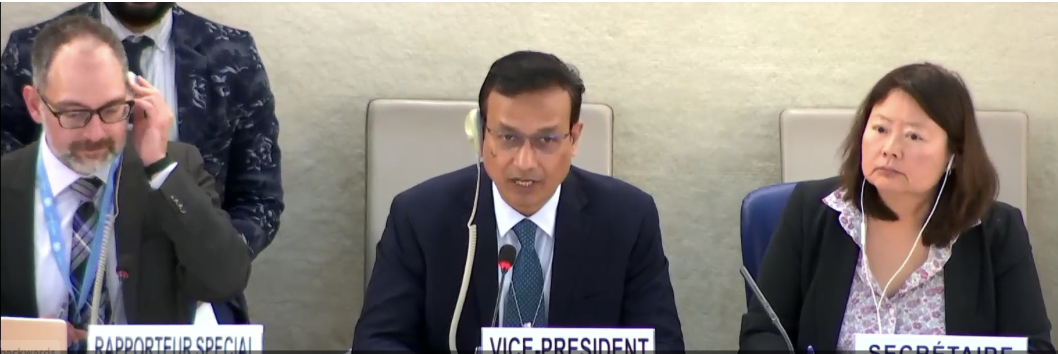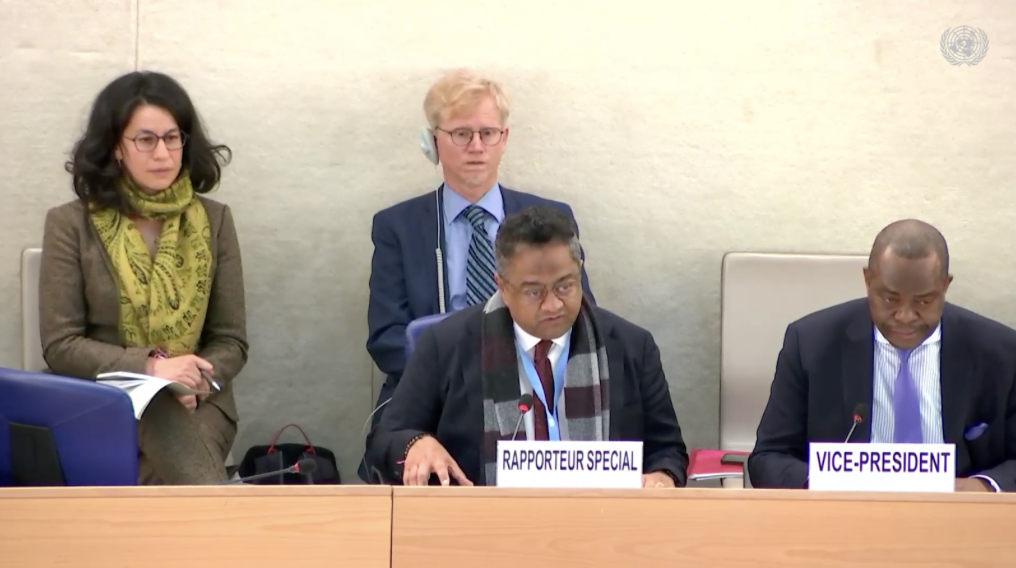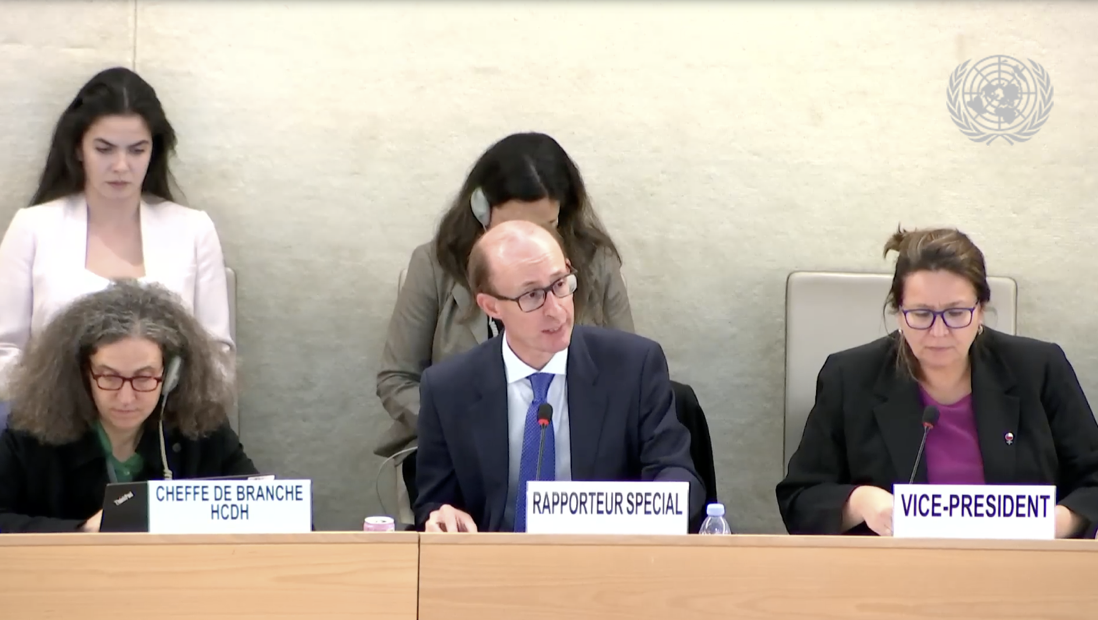HRC53: Taliban’s Subjugation of Women May Constitute As Gender Apartheid
The 53rd Session of the Human Rights Council
19th June - 14th July 2023
Item 2 - Annual report of the United Nations High Commissioner for Human Rights and reports of the Office of the High Commissioner and the Secretary-General
Enhanced interactive dialogue with the Special Rapporteur on the situation of human rights in Afghanistan and the Working Group on discrimination against women and girls, on a report on the situation of women and girls in Afghanistan
19th June 2023
By Eunike Mangampa / GICJ
Executive summary
On the 19th of June 2023, the Human Rights Council convened to discuss the report of the Special Rapporteur on the situation of human rights in Afghanistan and the Working Group on discrimination against women and girls on the situation of women and girls in Afghanistan (A/HRC/53/21).
The aforementioned report provided an overview of the systematic discrimination against women and girls in Afghanistan that has been exemplified since the takeover of the Taliban in 2021. It highlighted the misogynistic policies and prejudicial practices of the de facto authorities that have stripped the rights of women and girls in nearly all aspects of their lives. The report expressed that these blatant violations can be considered to be a form of gender persecution and an institutionalised framework of gender apartheid. The report, however, also praised Afghan women and girls for their resistance in the fight for their lives.
The interactive dialogue was opened by the Deputy High Commissioner, Ms. Nada Al-Nashif, who expressed her concerns about the discriminatory environment harboured by the Taliban. In alignment with experts’ recommendation of increasing the inclusion of Afghan women and girls in all forms of dialogue, the Council included the presence of various Afghan women. Non-governmental organisations also spoke to highlight multiple aspects of discrimination against women, especially Hazara women.
Geneva International Centre for Justice (GICJ) condemns the de facto authorities’ outrages against Afghan women and girls and their rights to education, work, and movement. GICJ supports the recommendations of the Special Rapporteur for States and all organisations to ensure that human rights are at the centre of all policy decisions and engagement with de facto authorities. In addition, GICJ calls for an extension of the Special Rapporteur’s mandate and the establishment of a new independent accountability mechanism.
Background
The rights of women have been repeatedly undermined throughout Afghanistan’s turbulent history. Women’s suffrage was first achieved in 1919, followed by other rights becoming gradually enshrined in the constitutions of 1923, 1964, and 1976. Women’s movements were integral to the attainment of these rights. It is essential to note the heterogeneity of women’s experience across the country, as the realisation of these rights was not equally spread across the country.
The Soviet invasion of Afghanistan in 1979 marked the beginning of a gradual regression of women’s rights. As the Mujahideen forces saw the women’s emancipation movement as a foreign-imposed policy, they aimed to reverse the advancements in women’s rights. The withdrawal of foreign forces and the ensuing civil war subjected women to extreme forms of violence, including extrajudicial killings, torture, enforced disappearances, and forced marriages. The Taliban’s takeover in 1996 incited a further erosion of women’s rights. As the Islamic emirate of Afghanistan was established, women and girls could no longer leave their houses without a Maharam, and their access to education and healthcare was limited. After the Taliban were pushed out in 2001, positive developments emerged. This includes the ratification of the Convention on the Elimination of All Forms of Discrimination Against Women, which Afghanistan is still party to today. However, with the Taliban’s return to power in 2021, it seems that women’s rights have yet again taken a step backwards.
The mandate for the Special Rapporteur on the situation of human rights in Afghanistan was reinstated on the 7th of October 2021, pursuant to resolution 48/1. Mr. Richard Bennett, the current mandate holder, assumed his post on the 1st of May 2022. In creating the joint thematic report, the Special Rapporteur collaborated with the Working Group on discrimination against women and girls. The mandate for the working group was first adopted in 2010 and is currently occupied by five independent experts. One of these experts is Ms. Dorothy Estrada-Tanck, who has been chairing the working group since the 1st of November 2020.
Joint Report of the Special Rapporteur on the situation of human rights in Afghanistan and the Working Group on Discrimination against Women and Girls
The joint report is a collaboration between the Special Rapporteur and the Working Group and focuses on the systematic discrimination that the Taliban has imposed since their return to power. For the report, a series of interviews with 79 Afghans was conducted, a survey with responses from 2,112 Afghan women was sent out, and a focus group was held with 159 women. Both mandates also visited Afghanistan and met with various stakeholders, including the de facto authorities, religious leaders, and victims of human rights violations.
The first part of the report underscores the systemic nature of gender-based discrimination. Since August 2021, the de facto authorities have suspended the 2004 Constitution and abolished government offices that promoted gender equality. Furthermore, the Taliban has continuously issued arrays of edicts that further chipped away at women’s freedoms and rights. The current restrictions on women and girls include a ban on education beyond primary school, suspension on the right to work for international and national NGOs, the United Nations and the government, prohibition from using gyms and entering parks, the requirement of a Maharam, and the wearing of a “proper hijab.” The issuance of these edicts illustrates the extent to which discrimination has been embedded into Afghanistan’s current legal framework. Not all new decrees are directed at women and girls; male civil servants can also be suspended if their female family members are not wearing the “proper hijab.” The report expressed concern that such punishments can only normalise discrimination and further take away the agency of women. These edicts violate international law and Afghanistan’s commitments to various human rights conventions. The Taliban masks this discrimination under the guise of “protecting women” and presents false promises about the temporary nature of these restrictions.
A section of the report is dedicated to understanding gender persecution and gender apartheid. The joint report has expressed that the discrimination of women and girls in Afghanistan can be constituted as gender persecution and an institutionalised form of gender apartheid. The report further mentions that gender apartheid has yet to be included as a crime under the Roman statute and asks for a report on gender apartheid to be mandated to consolidate international standards and preventive tools.
The report recommends that the de facto authorities rescind all edicts that have intentionally limited the rights and freedoms of women and girls. It also asks the Taliban to ensure that women and girls can meaningfully participate in the public and political sphere. Stopping gender-based violence should be a priority, as should accountability mechanisms and reparations for past victims. The report recommends that all policy decisions made by States and interactions with de facto authorities are made with the best interests of women and girls in mind. To the United Nations Organisation, the report recommends that further gender-sensitive assessments are made to better understand the obstacles these women and girls are facing and what solutions would be most pertinent to them.
Interactive Dialogue on the Joint Report
Opening Statements
Ms. Nada Al-Nashif, the Deputy High Commissioner for Human Rights, opened the session by explaining how the Taliban’s return to power had become an all-encompassing affront to women and girls’ rights in Afghanistan. She outlined how their issuance of edicts stripped girls of their right to education and barred women from working at international organisations and various public offices. Ms. Al-Nashif expressed the Office of the High Commissioner’s concern about the climate of fear the de facto authorities harboured. She called on the international community to influence the de facto authorities to cut back on their discriminatory policies.
The Chair of the Working Group on Discrimination against Women and Girls, Ms. Dorothy Estrada-Tanck, further explained that the oppressive environment, fostered by the de facto authorities, had exerted pressure on women in the household. This has thus increased cases of violence, forced and child marriage, the sale of children, child labour, trafficking, and unsafe migration. Women are put in increasingly violent environments where gender-related killings can happen even within their own homes. Yet, since the abolishment of all legislation and institutions that promote gender equality, women are now without legal protection as their perpetrators are able to bask in the light of total impunity.
Having completed his third mission to Afghanistan, the Special Rapporteur on the situation of human rights in Afghanistan, Mr. Richard Bennett, reported that the situation of human rights for women and girls has only worsened. He was steadfast in his mention that this deprivation of human rights can constitute a crime against humanity of gender persecution. The Special Rapporteur listed the various ways that states could contribute to alleviating the situation. This included a call to create a report on investigating gender apartheid in Afghanistan.
His Excellency Mr. Nasir Ahmad Andisha, the Permanent Representative of the Islamic Republic of Afghanistan to the United Nations Office in Geneva, lamented heavy-handed tactics to suppress women protesting in Afghanistan. Despite the violent pushback, Mr. Andisha believed the women’s resistance had moulded into a “historically unique women solidarity movement.” To support the plight of the Afghan women, the ambassador recommended that the mandate of the Special Rapporteur be strengthened, the human rights situation in Afghanistan continuously highlighted at various high level discussions, and that efforts working towards real and sustainable solutions be redoubled.
This session was particularly historic because of the inclusion of Afghan women’s voices. One voice represented on the panel was Ms. Madina Mahboobi, an Afghan human rights defender who chose to stay in Afghanistan after the fall of Kabul in August of 2021. She believed the current situation to be worsening the already vast number of human rights violations in Afghanistan. From her consultations with Afghan men and women, she expressed their shared demands for increased access to education and employment, protection of human rights defenders, regular consultation with the Afghan community, and others.
The other female Afghan voice on the panel was Ms. Shaharzad Akbar, Executive Director of Rawadari. She talked about the need for more involvement from the international community, noting that the extent of aid involved has been limited to the issuance of statements. She warned governments from engaging with the Taliban in a way that can be considered as recognition, including welcoming officials from the de facto government. To avoid impunity for perpetrators, further investigations must be conducted which strive for gender persecution, and an independent accountability mechanism should be established.
Interactive Dialogue
The Pakistani delegate spoke on behalf of the Organisation of Islamic Cooperation. He reiterated that the rights of women and girls to education and employment are fundamental. This, according to the delegate, is based on international human rights law and Islamic injunctions. He urged the de facto authorities to rescind actions that took away these rights from women and girls. He then called on the Special Rapporteur to investigate the impact of the asset freeze and the absence of banking generals on the realisation of human rights in Afghanistan.
On behalf of the Nordic countries, the Finnish delegation reiterated their support for human rights defenders and the protection of civic space. She expressed their condemnation of the systematic discrimination that is being instigated towards women and girls and warned of the damages that will be inflicted upon Afghan society due to this discrimination. The delegate urged the de facto authorities to comply with Afghanistan’s obligations under the Convention on the Elimination of All Forms of Discrimination Against Women (CEDAW) and other UN conventions to which Afghanistan is a state party.
The Belgian delegate, who spoke on behalf of 38 countries, proclaimed that the Taliban was “ruling through the most extreme forms of misogyny and institutionalised gender-based discrimination.” The delegate urged the Taliban to repeal all decisions that promote this discrimination, as it violates the principles of proportionality and non-discrimination. He closed his statement by underscoring the need for a victim-centred approach to pursue accountability for perpetrators.
The South African delegate mentioned that the discrimination happening in Afghanistan is contrary to the Vienna Declaration and Programme of Action (VDPA). The VDPA outlines that the “human rights of women and girls are inalienable, integral and indivisible part of universal human rights.” The delegate said that the decrees of the de facto authorities may amount to the crime against humanity of gender persecution. Ms. Levy then called on the international community to take action against what has been described as gender apartheid by the joint report, and support Afghanistan like it has done in South Africa’s fight against racial apartheid.
The representative of Qatar underlined the importance of dialogue with all Afghan stakeholders in promoting human rights. She mentioned that this humanitarian crisis has been worsened by the country’s deteriorating security, political and economic issues. The delegate also spoke about Qatar’s collaboration with Indonesia in organising an international conference on the education of Afghan women. In December 2022, Indonesia hosted the first meeting session in Bali, and Qatar will hold the next session in Doha in November 2023. The conference aims to implement practical solutions by mobilising support and encouraging international cooperation.
Civil society organisations were united in condemning the edicts that have purposely discriminated against women and girls. They called for the immediate rescinding of these harmful policies and urged member states to take concrete actions to alleviate the situation. One NGO speaker spoke about her experience as a former detainee in Afghanistan. She mentioned her experience of being tortured in various ways and recounted the instances where she had to beg the Taliban for her life. Another NGO highlighted the persecution that the Hazara people in Afghanistan have faced. As a religious minority, their maltreatment has remained widely underreported locally. The Taliban, as a primarily Pashtun organisation, has dominated the Hazaras in all spheres of life. Hazara women are especially vulnerable to intersectional discrimination based on gender, religion and ethnicity. The Taliban has politicised humanitarian aid, thereby diverting it from groups in need, such as the Hazaras, to provide for their supporters instead.
Closing Statements
To close the session, panellists took the time to answer questions put forward by the council. Ms. Dorothy Estrada-Tanck addressed the question of what could be done to support the plight of Afghan women and girls. The Chair of the Working Group on discrimination against women and girls proposed the solution of supporting organisations that address the structural issues present in Afghanistan, especially those that are women-led. Ms. Estrada-Tanck noted that this erosion of women’s rights is present worldwide and hence asked states to support UN mandates that raise women’s voices. She also spoke about the need to involve male members of the community to promote a culture of human rights. Only by dismantling harmful stereotypes of the inferior status of women, will we be able to target the root causes of this gender discrimination.
As the last speaker of the session, Mr. Richard Bennett addressed questions again related to proposed solutions. The Special Rapporteur reiterated the need to involve Afghan women and girls in discussions around their livelihood and consult them on possible solutions. Mr. Bennett reminded the council that although engagement with the de facto authorities is needed, it must be done in such a way that does not normalise their violations and legitimise their rule. He also brought up two issues that were not highlighted as much in the discussions. Approaching the issue of discrimination through an intersectional lens, Mr. Bennett highlighted certain groups more prone to marginalisation, such as Hazara women and women with disabilities. The second issue was a warning against the radicalisation of education by the Taliban. As talks of a more conservative curriculum begin to circulate, the implications of this could be far-reaching and may even pose security concerns in the future.
Position of the Geneva International Centre for Justice
Geneva International Centre for Justice (GICJ) condemns the de facto authorities’ affronts to the rights of women and girls in Afghanistan. Their discriminatory edicts have done nothing to “protect women and girls” and instead have exposed them to even more violence by subjugating them as second-class citizens. These crimes which amount to gender persecution and an institutionalised form of gender apartheid must be trialled, and their perpetrators held accountable. Hence, GICJ calls on the establishment of a new independent accountability mechanism.
As Special Rapporteur Richard Bennett said, “Solidarity is welcome, [but] it is not enough.” This statement underlines a critical oversight in the discussion: a lack of practical action plans. GICJ calls on states to further support Afghan women and girls by providing scholarships, offering simplified asylum procedures, and contributing to the provision of direct humanitarian and developmental assistance. As the de facto authorities continue to punish Afghan human rights defenders, it becomes the responsibility of the international community to use their platforms to amplify the voices of those who have been silenced.
United Nations, Geneva4Justice, GICJ, Geneva International Centre for Justice, Afghanistan, Education, Women’s Rights, Gender Equality, Gender Discrimination







